Faculty News
Faculty of Arts Organizes Educational Seminars on Role of Cultural Platforms in Developing Youth Awareness

As part of the activities of the Alexandria University Cultural Salon, Professor Dr. Abdelaziz Konsowa, President of the University, participated today, in the educational seminar organized by the Faculty of Arts under the title "The Role of Cultural Platforms in Developing Youth Awareness", in which speakers included Dr. Helmy El-Namnam, former Minister of Culture, Dr. Ahmed Zayed, Director of the Library of Alexandria, and Dr. Enas Diab, Professor at the Faculty of Specific Education and Director of Horreya Creativity Centre. The event took place the Grand Hall of the Faculty and Leadership Development Centre at the Faculty of Nursing in Smouha, in the presence of Dr. Hani Khamis Abdo, Dean of the Faculty of Arts, and Dr. Mohamed Abdellah, former university president, as well as deans, vice-deans, faculty members and university students.
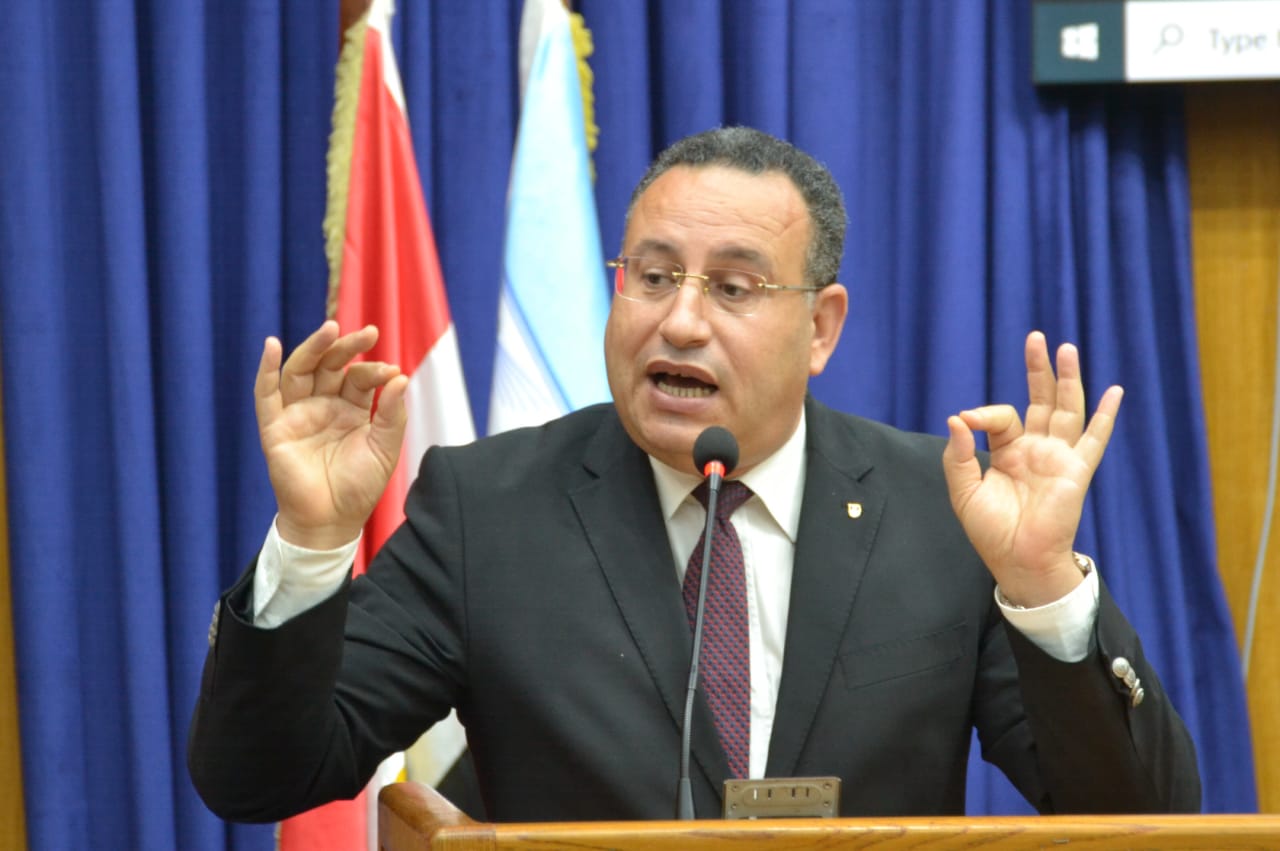
In his speech on this occasion, Dr. Abdelaziz Konsowa welcomed the attendees, stressing the university's keenness to hold educational seminars and host enlightened cultural symbols in order to spread awareness among its students, so that culture as a comprehensive concept becomes an essential pillar in building their personalities. He stressed the association of economic development to cultural development, and the need to raise awareness and introduce the efforts of the state in the implementation of a large number of national projects, in light of huge challenges at all levels. Dr. Konsowa affirmed that that the only solution to all problems is good education and enhancing the feeling of belonging to the homeland. He explained that the university is working according to the rapidly and dynamically developing strategy of the Ministry of Higher Education, in order to improve the quality of education, to reach a globally high level, capable of building the new republic through an integrated system of public, private and international universities, and providing learning opportunities and increasing knowledge. He directed students to benefit from the knowledge bank that allows access to scientific research free of charge that is not available to many students in the countries of the world as it is an unprecedented Egyptian experience. The University President directed the students to exert all efforts to obtain knowledge in the different disciplines, explaining that education is a continuous process that does not stop, as it has to keep pace with rapid changes in the various scientific and academic fields.
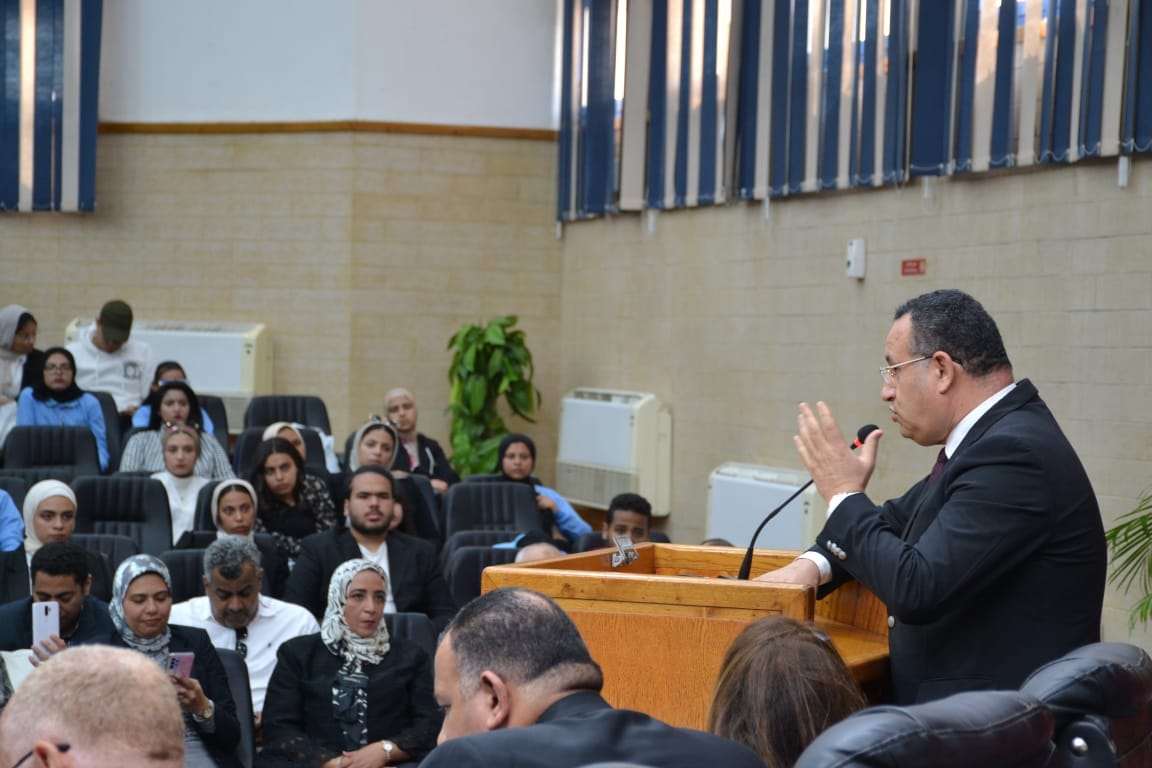
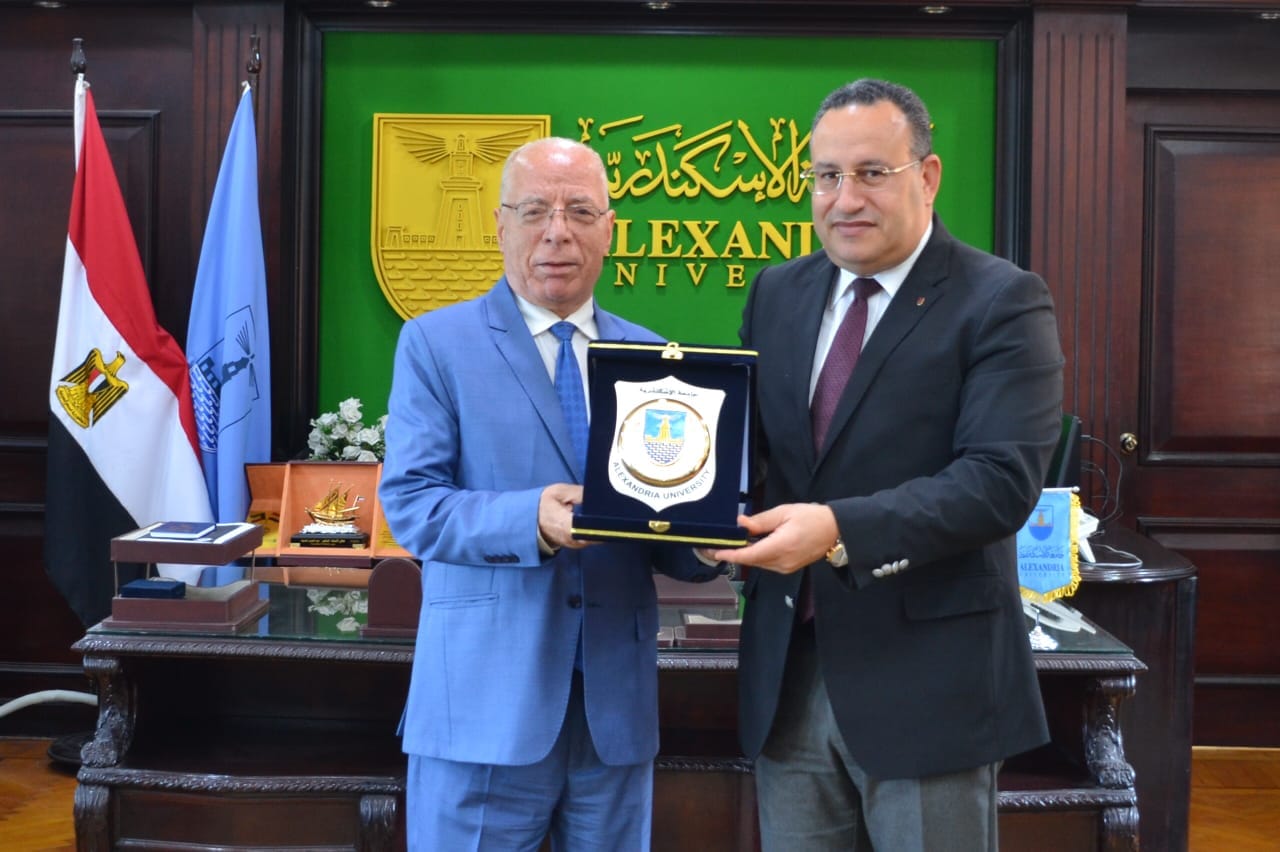
Dr. Helmy El-Namnam expressed his pleasure for being at Alexandria University, which was founded by Dr. Taha Hussein, one of the most prominent symbols of culture in Egypt and the Arab world, stressing the importance of this seminar. He pointed out that the issue of awareness is an inevitable necessity for all societies, for all groups of people, at all times in general, and at the present time in particular, where countries face the problems of fragmentation and division. He added that we are at a time when many societies around us were facing this danger, while Egypt was able to overcome many attempts of division, thanks to the cohesion between the Egyptian people and its deep-rooted institutions, including the army, police, Al-Azhar and the Egyptian Church. Dr. El-Namnam stressed the need to work and continue to spread cultural awareness to continue this national cohesion facing all of these attempts.
Dr. Ahmed Zayed pointed to cooperation between Alexandria University and Bibliotheca Alexandrina in many cultural activities that contribute to spreading awareness and culture in Alexandrian society. He stressed the importance of expanding the concept of awareness to building the mind and self and how to form a conscious self-capable of guarding itself from external conspiracies that aim to control the minds, in light of societies that suffer from many dangers such as illiteracy, terrorism, pollution and lack of awareness. He stressed the importance of how we must identify the problems facing our country and develop comprehensive solutions according to the jurisprudence of priorities, where young people face the danger of consumption culture and the gap between ambition and possibilities expands. He also pointed to the danger of social networking sites that represent a double-edged sword that can have a positive impact as a tool for culture and communication but can also be used negatively as a tool for segregation, spreading aggressive ideas, destroying awareness and dismantling society.
Dr. Hani Khamis pointed to the role of Alexandria University and the Faculty of Arts in raising awareness, spreading enlightening thought and discussing societal issues in light of the challenges facing our homelands through negative phenomena that disturb the public and broadcast negative energy and fear of the future, spreading rumours through modern media and technology. He explained that culture and art play a pivotal role in spreading awareness, spreading the spirit of belonging and loyalty to the homeland and enhancing the feeling of national identity. He highlighted the role of the Ministry of Culture in opening cultural centres in various governorates in order to provide cultural activities and events that spread awareness among young people. Dr. Khamis praised the role of the Library of Alexandria as a beacon of culture, that provides an opportunity to discuss national problems and challenges, provide unconventional solutions, and enhance youth awareness by developing a culture of reading.
Dr. Enas Diab stressed the importance of cultural platforms in promoting communication and cooperation among young people through offering cultural, artistic, and educational events to build a coherent society. She explained that cultural centres organize many workshops, theatrical performances, exhibitions of plastic art and photography, concerts, cultural, literary, poetic events, drawing workshops and cinema clubs. These activities provide cultural, emotional and social support for youth, encourage innovation and creativity, promote the values of culture, belonging, diversity, qualification and training of young people for the labour market, and support for people with cultural and social determination, indicating the role of Horreya Creativity Centre in organizing many activities, events and cultural seminars in cooperation with Alexandria University, to raise the level of awareness among young people, and its future plan to increase these activities.
The seminar concluded by several discussions between the guests and the attendees from students of various faculties, during which they stressed the importance of continuing organizing events related to spreading awareness and culture and how to confront rumours.
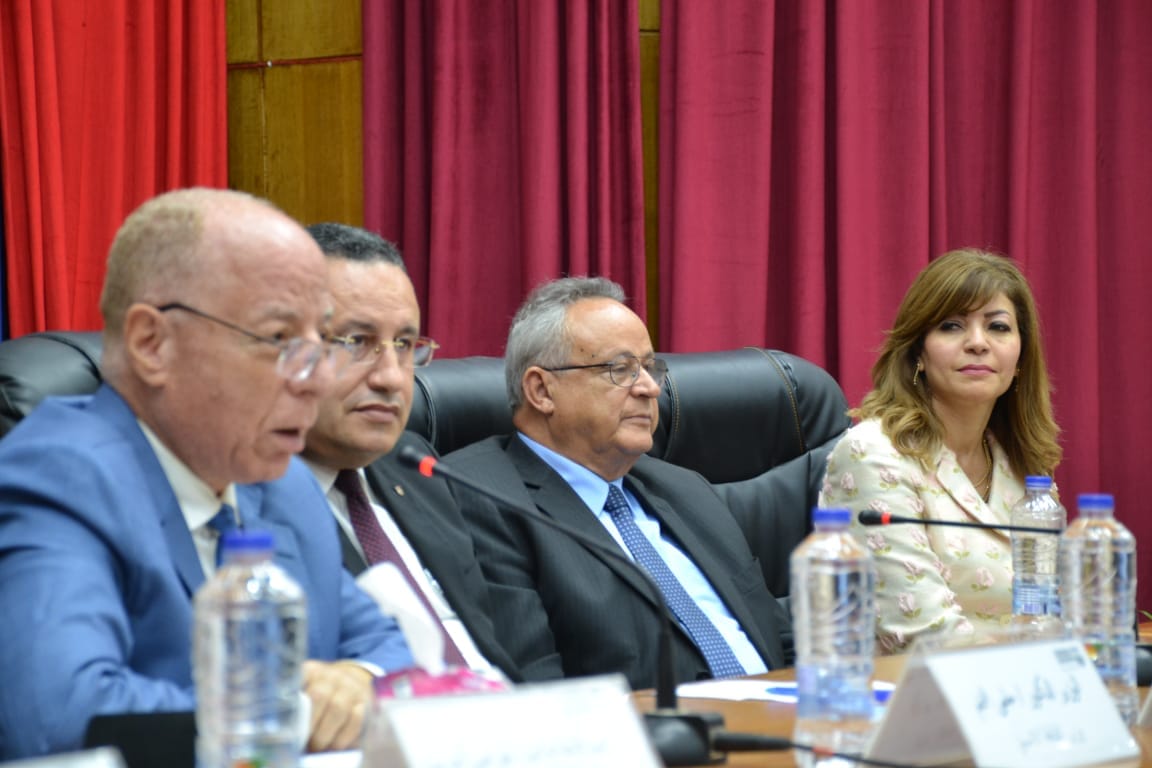
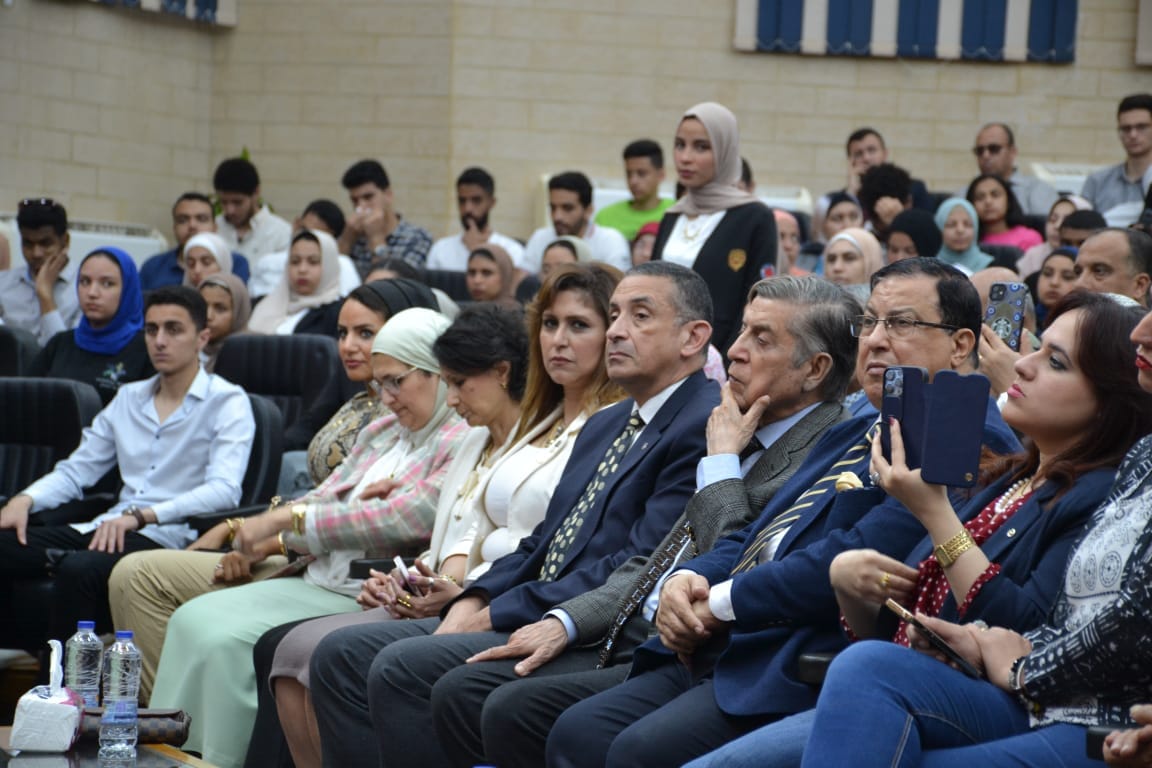
Faculty of Economic Studies and Political Science, discusses the challenges of academic work in light of the applications of artificial intelligence
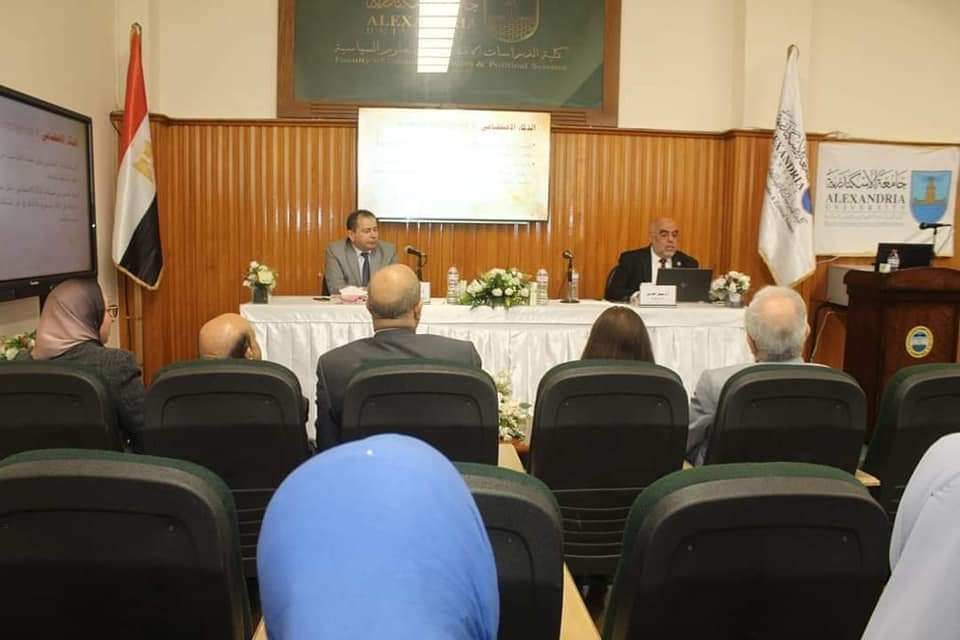
Under the auspices of Dr. Abdelaziz Konsowa, President of Alexandria University, the Center for Research and Economic Studies at the Faculty of Economic Studies and Political Science held a symposium entitled "Challenges of Academic Work in Light of Applications of Artificial Intelligence", in which Dr. Nabil Salah Al-Arabi, professor of digital economics at the faculty and consultant for one of the projects of the program, spoke. Formerly United Nations Development.
In his speech, Dr. Ahmed Wahban, Dean of the Faculty, pointed out the importance of the topic of the symposium, its novelty, and the repercussions of the rapid successive developments in the world of artificial intelligence, which may be very dangerous for the future of scientific research.
During his lecture, Dr. Nabil Al-Arabi identified the most prominent topics of the symposium, which is the definition of the automated interlocutor with artificial intelligence (ChatGPT), its most important characteristics and versions, how it works and practical examples of its use in teaching tasks (course design / test setting / test answer / correcting assignments / explaining concepts to students / answering questions / solving problems) And practical examples of its use in scientific research: (proposing a research idea/ presenting a general background on the subject/ presenting a list of references on the subject/ writing an article with references/ reformulating the text/ translation), and weakness. The most important challenges of the applications of artificial intelligence in academic work were discussed, the most important of which is providing reasonable but incorrect answers, fake citations, and threatening the integrity of scientific production with plagiarism and dissemination of misleading information.
Faculty of Education for Early Childhood Organizes Educational Seminar on the Glorious October War Victory
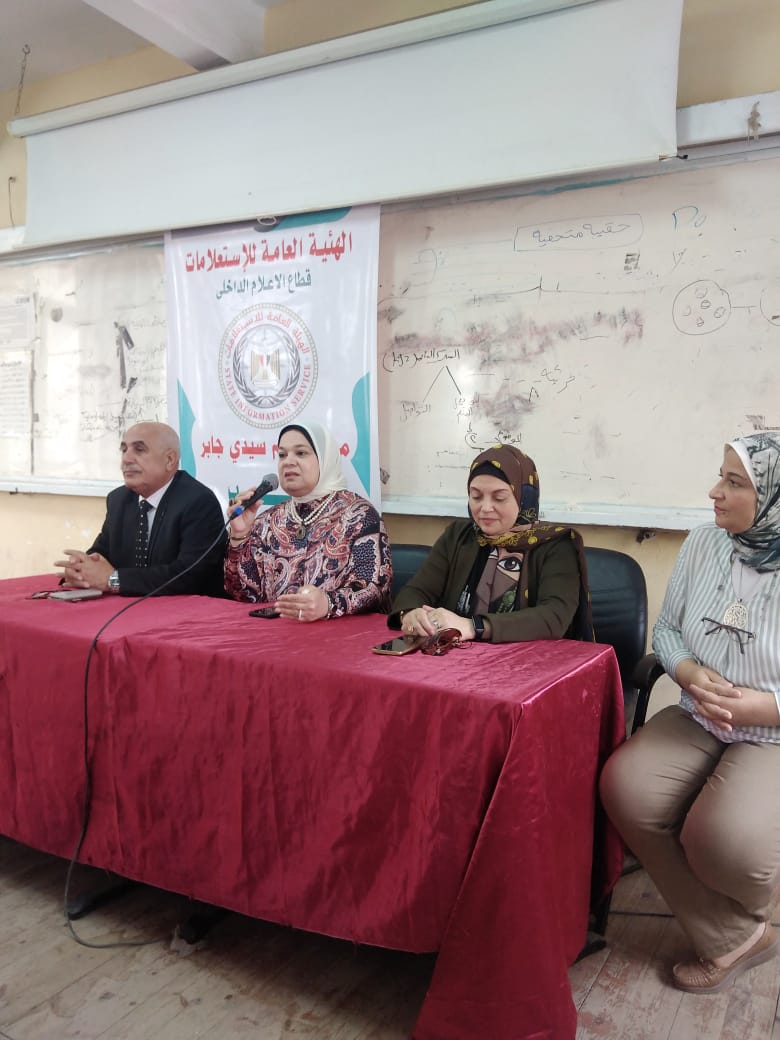
Under the auspices of Professor Dr. Abdelaziz Konsowa a, President of Alexandria University, the Faculty of Education for Early Childhood organized an educational semibar to celebrate the golden jubilee of the glorious victories of the October War, with the participation of Major General Hashem Abul-Fadl, one of the prominent participants in the October War, in the presence of Dr. Rehab Mahmoud Siddiq, Dean of the Faculty, and Dr. Rehab Barghout, Vice Dean of the Faculty for Educational & Student Affairs, as well as several faculty members, employees, and students.
In her speech, Dr. Rehab Siddiq affirmed that the glorious October victory was not easy, as this great victory was preceded by the setback of the 1967 War, which showed the true determination of the Egyptian people in their standing behind their national army, as they rejected defeat and endured all difficulties in order to support their national army. She added that the Egyptian Armed Forces actually succeeded in fulfilling the hopes of the Egyptian people and lived up to their expectations, by achieving this great victory in 1973.
While Major General Hashem Abul-Fadl gave a lecture on the role of the Air Defense Forces in the October War, noting that the October War is a unique war, because it gave a unique lesson in the arts of war in the modern era, stressing that the current generations must draw inspiration and lessons from this great victory. He also pointed out that the October War was a historical war in the true sense of the word, and left positive effects firmly established in the conscience of the Egyptian people to this day. Major General Abul-Fadl pointed out that the genes of the Egyptian army are genes that do not accept defeat. He added that he remembers well to this very day the spirit of resolve and persistence after the setback of 1967, and the determination of the Egyptian soldiers not to return home until the land of Sinai was returned to Egypt again. He also highlighted the War of Attrition, as that period included many of the achievements of the Egyptian forces, including sinking the Israeli destroyer Eilat and destroying the Barlev Line. He stressed that the October War set the most wonderful examples of the nation’s unity between Muslims and Christians, pointing out that Egypt does not have tribal or religious tendencies, citing the Christian heroes in the battle and their role in achieving victory. Major General Abul-Fadl touched on the stories and heroism of the Egyptian soldiers during the war, and called on all students to emulate them because they sacrificed their precious lives for the sake of the homeland so that we could live free to this day.
At the end of the semibar, Major General Hashem Abul-Fadl answered the students’ questions in the lecture he delivered, which witnessed a large student presence.
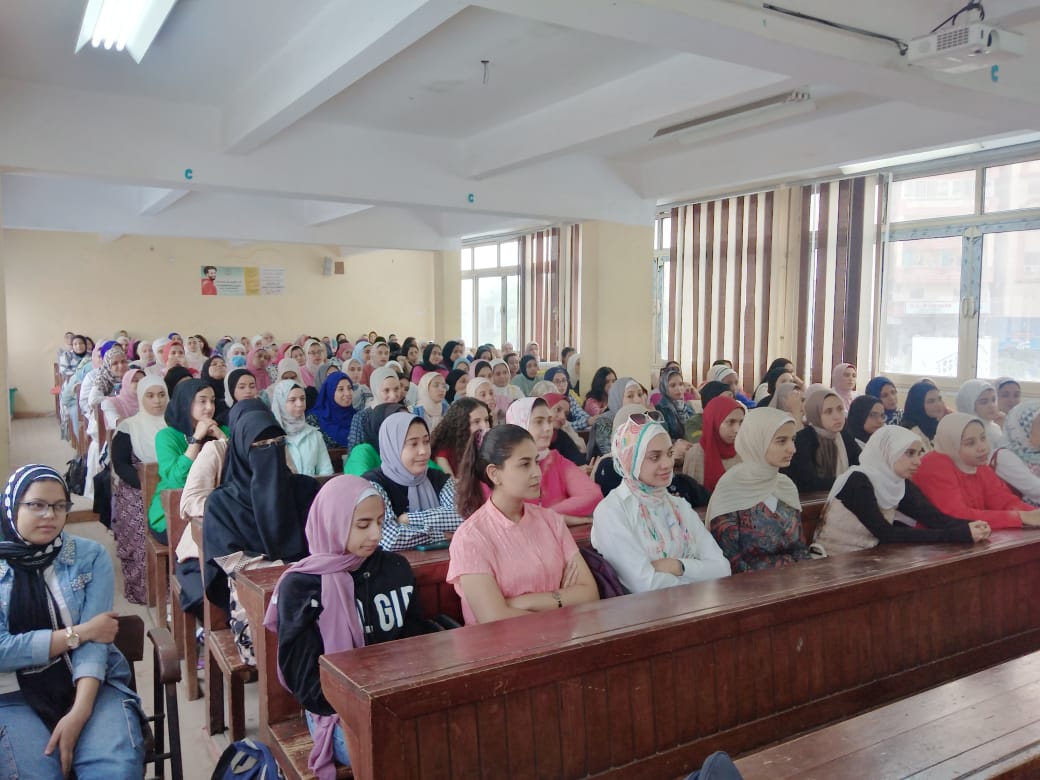
Discussing Cooperation between Faculty of Fine Arts, Alexandria University, and Bauhaus University in Germany
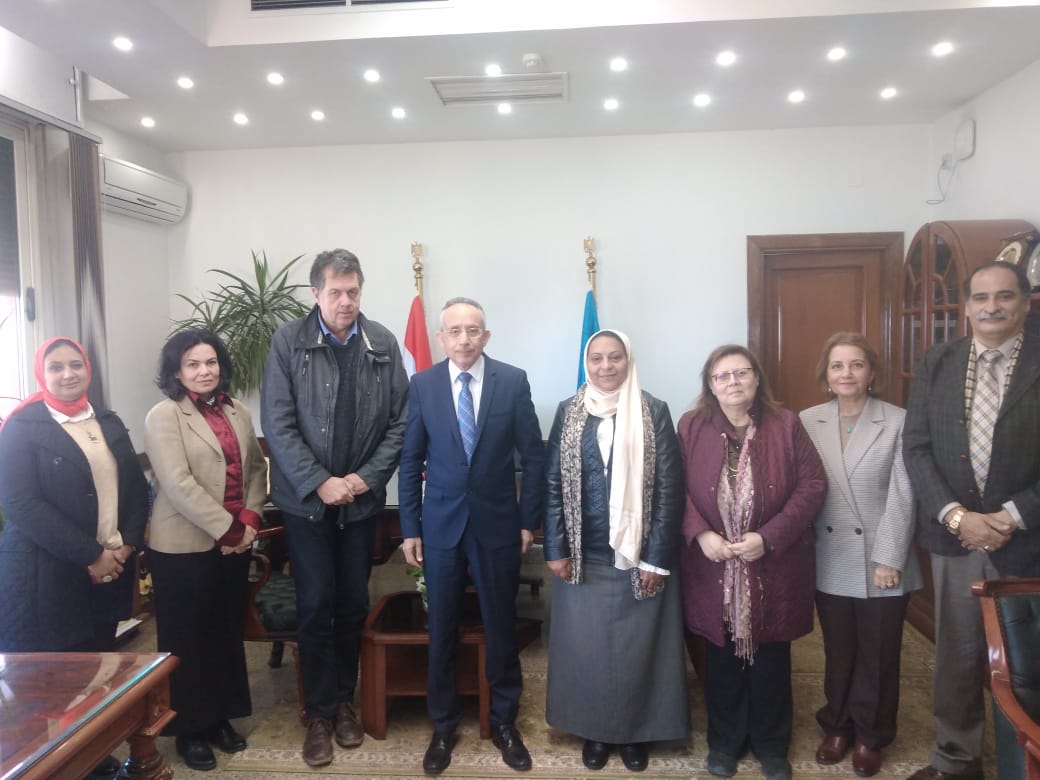
Dr. Ashraf El-Ghandour, Vice President for Graduate Studies at Alexandria University, received Dr. Frank Eckhardt, Head of the Planning and Social Studies Department at the Bauhaus University in Weimar, Germany, with the aim of discussing ways of cooperation between the Faculty of Fine Arts at Alexandria University and the Bauhaus University in Germany in areas of common interest.
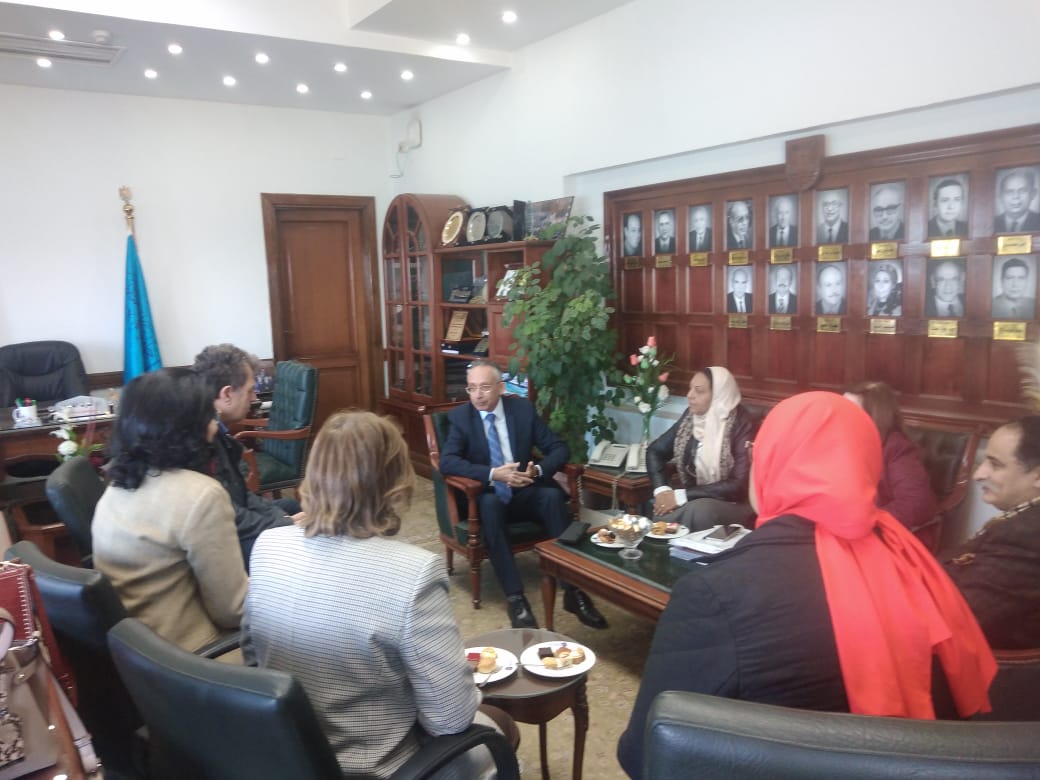
The meeting was attended by Dr. Dina Mandour, Dean of the Faculty of Fine Arts, Dr. Nevin Gharib, Vice Dean for Education and Student Affairs, Dr. Sahar El-Arnaouti, Vice Dean for Postgraduate Studies and Research, Dr. Mona El-Masry, Head of the Architecture Department, and Dr. Mai Karam, Coordinator of Cooperation with the Bauhaus University.
In his speech, Dr. Ashraf El-Ghandour stressed that the Bauhaus University is one of the oldest and most prestigious universities in Germany, specializing in plastic arts, sculpture and architecture, which will open the way for discussing means of cooperation in the fields of architecture and fine arts between the German University and Alexandria University represented by the Faculty of Fine Arts, especially in the areas of common interest.
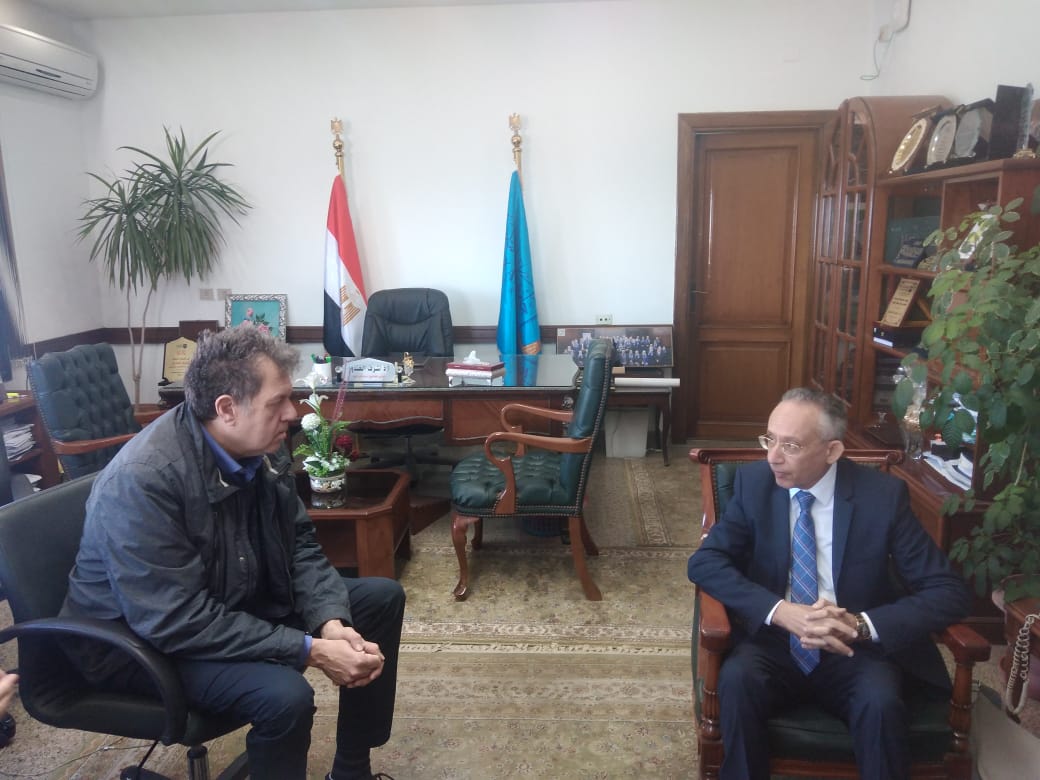
El-Ghandour pointed out that cooperation can also include the establishment of joint scientific degrees, the exchange of experiences, participation in scientific seminars and conferences, and student exchange whether on undergraduate and postgraduate levels, in order to connect with the international cooperation network in the various scientific and research fields.
While Dr. Frank Eckhardt confirmed that his university is keen to open prospects for cooperation with Alexandria University, which has a unique architectural heritage, pointing out that the Bauhaus University also possesses a unique architectural heritage, as the Bauhaus University building is one of the sites on the UNESCO list of World Heritage Sites, noting that this common historical heritage between the two universities will result in unique cooperation with Alexandria University in the fields of engineering and architecture.
Faculty of Nursing organizes its symposium on the occasion of the 50th anniversary of the glorious October Victory
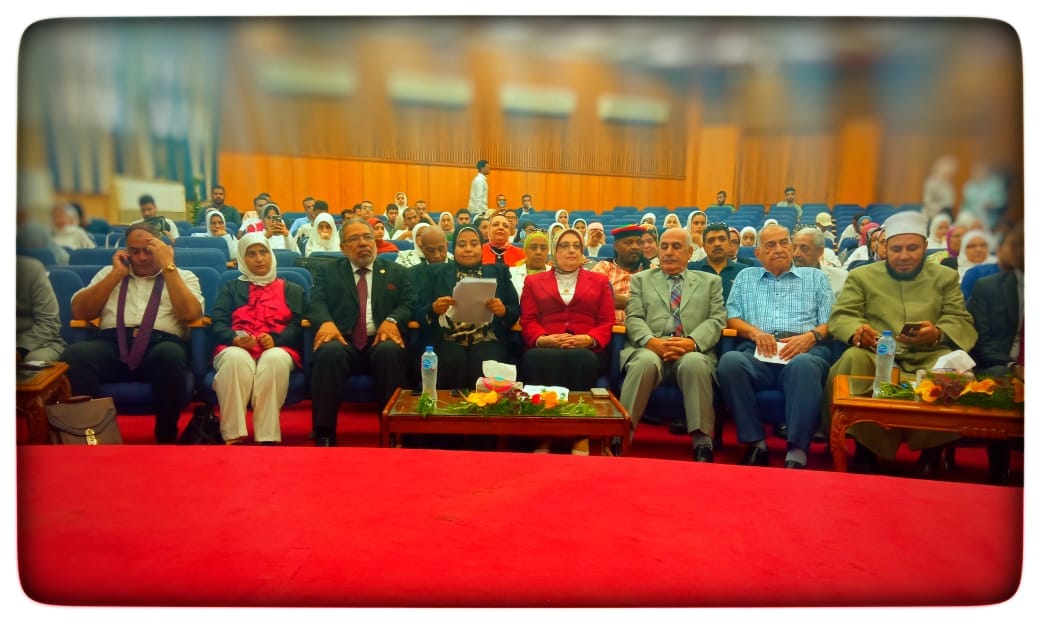
Under the auspices of Dr. Abdel Aziz Konswa, President of Alexandria University, Faculty of Nursing, in cooperation with the Ahl al-Tawfiq Charity Association, organized an educational symposium on the occasion of the 50th anniversary of the glorious October victory, in which Major General Staff Mahmoud Salem, one of the heroes of the October War, and Major General Hashem Abu al-Fadl, one of the heroes of defense, participated. Air Force and the October War, in the College’s Blue Hall.
The celebration included reciting poetry, speeches, and memories from the heroes of the October War.
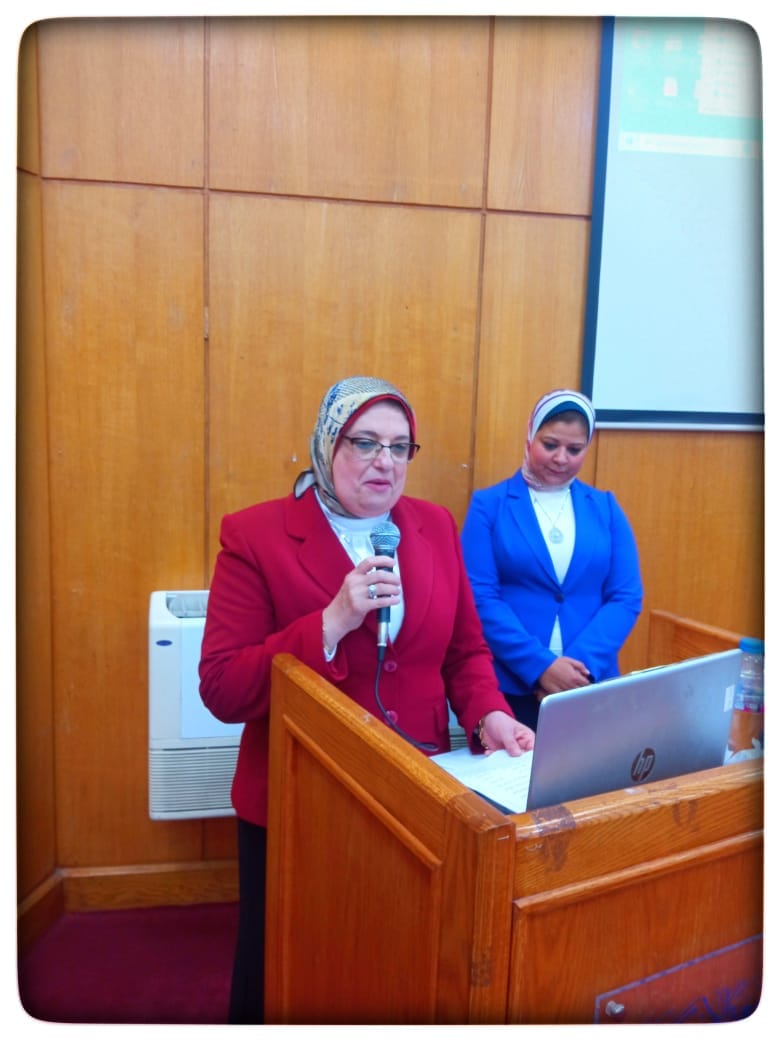
In her speech, Dr. Nefertiti Zaki, Dean of the College, affirmed her pride in this occasion in which we remember the greatest epic in our modern history, which is the October Victory. She congratulated the military leaders and the valiant armed forces on this great occasion.
While Dr. Hanan El-Sherbiny confirmed that Egypt’s wealth in the October War was the human wealth that created the miracle of the crossing, stressing that we are now facing the second crossing towards building the new republic, and that we must be inspired by the spirit of October, which is considered a dream, and the October dream is a dream of pride, victory and dignity.
Participating in the celebration were Dr. Muhammad Farid, Head of the Doctors Syndicate, Dr. Ibrahim El-Gamal, Director of the Fatwa House in Alexandria, Mrs. Safaa Tawfiq, Director of the Ahl al-Tawfiq Association, and Dr. Hani Morris, Director of Caritas, and a number of representatives of scientific, health, trade union and media bodies and institutions, and a group of faculty members, college workers and students.

 English
English